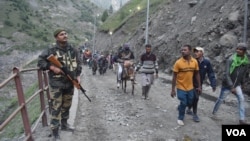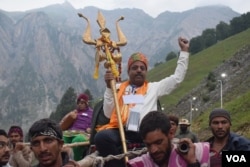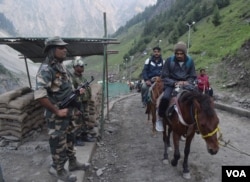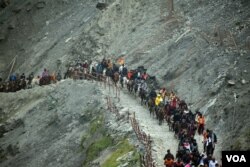Amid fear and tight security, a 43-day annual Amarnath Yatra — a Hindu pilgrimage to a cave located 3,888 meters above sea level — is underway in India-administered Kashmir after a gap of three years.
Over half a million pilgrims are expected to take part in this year's Yatra, which began on June 30. According to the latest reports, about 50,000 pilgrims visited the holy shrine within the first few days, defying anxiety over the low-intensity insurgency in the Muslim-majority region.
Authorities expect a spike in the number of pilgrims this year because of pent-up demand. The Yatra was canceled in 2019 amid widespread lockdowns after the Indian government abruptly revoked the regions' semi-autonomous status on August 5 of that year. The COVID-19 pandemic forced the event to be postponed in 2020 and 2021.
"Unfortunately, I was not able to come due to the COVID lockdown" for those two years, said Mansih Jatt, a Hindu devotee who is on his fourth visit to the cave. "It is a pleasure to see the resumption of Yatra again with better security and better facilities."
Security beefed up
In view of the security threats, the government of India has deployed army and paramilitary forces along with the Jammu and Kashmir Police and State Disaster Response Force teams on the main routes used by pilgrims on their way to the cave.
According to the South Asian Terrorism Portal — a database tracking terrorism and low-intensity warfare in South Asia — 33 individuals identified as terrorists were killed in the Kashmir region in June, the highest total for any month this year. The region has also seen a recent spike in targeted killings, including some aimed at the minority Hindu community.
But the heavy security arrangements are providing comfort to the pilgrims.
"I am happy to see how the government has provided security to us from Jammu to the Holy Cave," said Pravesh Kumar Bal, a pilgrim from the Indian state of Uttar Pradesh. "Earlier, we were scared of coming here, as militant outfits had warned security agencies of attacking Yatris, but seemingly, this place is peaceful and safe."
The multiple layers of protection for the pilgrims include drone surveillance, radio frequency identification and hundreds of new CCTV cameras in addition to those already in place.
Jammu and Kashmir Lieutenant Governor Manoj Sinha told the media on Sunday, "Security forces have coordinated in a better way, and I can say that one of the best arrangements regarding security are in place and by the grace of God, everything is going on well."
Business: gain or loss?
The pilgrimage provides an important source of income for local businesses and others who provide the visitors with food, accommodation, souvenirs and other amenities.
"Last three years were extremely terrible for us to survive," said Imitiyaz Ahmed Reshi, a resident of Srinagar who provides tent accommodation to the pilgrims. "Our businesses directly depended on Yatra. I hope that this year Yatra will end up peacefully."
The Kashmir Chamber of Commerce and Industry, a local trade organization, calculates that the three years of lockdowns and cancellations have cost the region $7 billion.
Zakir Ahmed, who offers a service that transports pilgrims using small horses or ponies, told VOA, "We faced myriad problems from the last two years as the government suspended Yatra. Now, everyone here is happy — pony wallas, tent providers and shopkeepers. We hope this year we could earn enough to manage our living."
However, the unprecedented security arrangements have irked some shopkeepers, tourists, fruit growers and tourism service providers who make their living from trekkers and other visitors not associated with the pilgrimage.
Rauf Tramboo, the president of Adventure Tour Operators Association of Kashmir, told VOA his association members are frustrated that many popular hiking routes have been closed during the Yatra, disrupting the three- to four-month trekking season from June to September.
"We have taken advance booking from tourists who were supposed to come here for hiking but due to inaccessibility of the tracking areas in the valley, over 3,000 trekkers have canceled their trips. We have suffered a huge loss," he said.
Everyone in the Kashmir Valley's tourism trade understands the security concerns, he noted. Tramboo added, though, that "the government could have informed us well in advance so that we wouldn't have taken any booking for the Yatra days."
Farooq Kuthoo, president of the Travel Agents Association of Kashmir, said he has been receiving daily calls from distressed tourists who are upset at being barred from some popular destinations.
"The government should not discriminate between leisure and pilgrimage tourism," he said.
There are also reports of trucks being halted on the Srinagar-Jammu National Highway, which connects Jammu with the Kashmir Valley and is the main Yatra route. Fruit growers in north Kashmir's Sopore area held a protest Saturday against the halting of trucks.
Yet another threat is posed by the COVID-19 pandemic, which has seen a recent surge with more than 16,000 new cases across India and 24 deaths on Sunday alone. The number of daily new cases in Jammu and Kashmir rose from 19 to 74 in the two weeks through Saturday.
In anticipation of medical emergencies, doctors and paramedics have been deployed. Also, two 50-bed hospitals have been set up by the Defense Research and Development Organization with the funds provided by India's Ministry of Health and Family Welfare.
Wasim Nabi contributed to this article.







